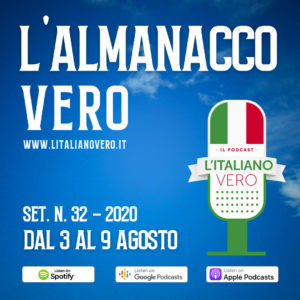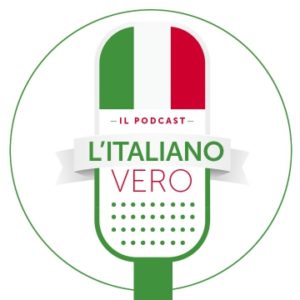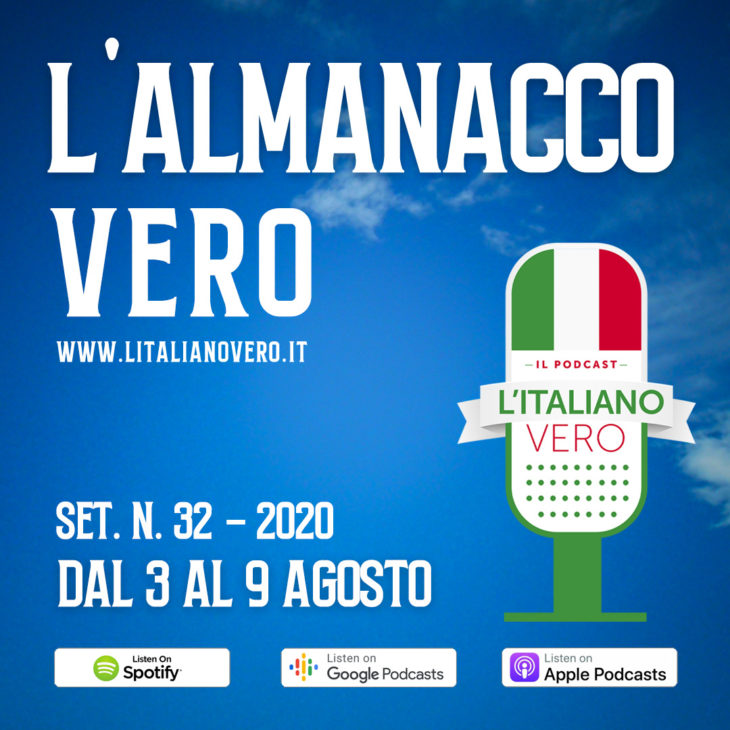
Blog in italiano – tempo di lettura: 4 min
Blog in English – reading time: 4 min
Blog in italiano
________________
E’ tempo di vacanze!
Gli italiani questa estate, causa pandemia, restano per la maggior parte dentro i confini nazionali. Quale occasione migliore per percorrere la nostra bellissima Italia in lungo e in largo?!
Cubo, come sappiamo, è stato al sud, in Campania, io sono appena tornata da qualche giorno in Umbria mentre Michela è in Trentino a godersi il fresco…Ma in sostituzione di Michela, abbiamo un ospite mai visto di cui siamo grandi fans: Linda, del podcast “Pensieri e parole”, che consigliamo davvero a tutti voi! Linda parla molto di arte e di cultura italiana, quindi compensa un po’ le nostre mancanze! Seguitela!
Salutiamo tutti, in particolare Christoph che ha aumentato la sua donazione e Anna che ci ha aiutato a scegliere gli argomenti di oggi!
3 agosto
1778 – Viene Inaugurata la Scala di Milano (242 anni fa): È uno dei simboli culturali di Milano e tra i più prestigiosi teatri a livello mondiale per le sue vicende storiche, la sua meraviglia architettonica e per le opere che vanno in scena ogni stagione. Per tutti è semplicemente “La Scala”.
Quando un incendio distrusse l’antico Teatro Ducale, nel 1776, l’arciduca Ferdinando d’Austria ordinò la costruzione di un nuovo edificio. Il progetto fu affidato all’architetto Giuseppe Piermarini, secondo le linee neoclassiche proprie di quel periodo, due anni dopo, sulle note di Europa riconosciuta, opera di Antonio Salieri, venne inaugurato il Teatro alla Scala, alla presenza dell’arciduca Ferdinando d’Asburgo-Este.
Da allora si sono esibiti lì i più grandi compositori, interpreti e direttori d’orchestra della storia della musica, come Gioachino Rossini, Giuseppe Verdi, Giacomo Puccini e Arturo Toscanini, Maria Callas ed Herbert von Karajan e più avanti Claudio Abbado.
Il “tempio della lirica” è un punto di riferimento mondiale per i suoi cartelloni di balletto, musica classica e, naturalmente, opera lirica e ogni anno “la prima” alla Scala si trasforma in un evento mondano, per il gran numero di personalità note che ne vantano la partecipazione da spettatori.
5 agosto
1988 – Nasce Federica Pellegrini (32 anni fa): è una grande campionessa e la prima nuotatrice italiana a vincere l’oro alle Olimpiadi.
La vita di Federica è piena di successi e record ma sicuramente anche sacrifici! Pensate che già quando aveva 16 anni conquistò l’argento olimpico nei 200 metri stile libero e 13 anni dopo, ai Mondiali di Budapest, con una stupenda rimonta nell’ultima vasca, vinse contro le sue agguerrite e più giovani rivali.
E’ detentrice, in vasca lunga, dal 2009 del record mondiale sui 200 (1’52″98) ed europeo sui 400 metri (3’59″15) stile libero (anche primato mondiale fino ad agosto 2014).
Nel 2008 a Pechino, arrivando prima nella gara dei 200 metri stile libero, diventa la prima nuotatrice italiana a vincere una medaglia d’oro alle Olimpiadi. In quelle di Atene 2004 si classifica al secondo posto sempre nella medesima gara. Nella cerimonia di apertura dei Giochi di Rio 2016 è la portabandiera dell’Italia. Nei suoi 200 m sl si ferma però ai piedi del podio.
In vasca lunga ai Mondiali, dal 2007 al 2019, conquista 6 ori, 4 argenti e 1 bronzo, e agli Europei, dal 2004 al 2016, 7 ori, 4 argenti e 4 bronzi.
La grandezza di un campione si misura proprio in questa longevità nel mantenere un record, soprattutto in uno sport molto fisico, come il nuoto in cui non ci vuole solo preparazione fisica ma si deve anche “avere testa”(essere capaci di reggere psicologicamente).
6 agosto
1991 – Inizia l’era di internet (28 anni fa): Il 34enne Tim Berners-Lee, ricercatore del Cern, trova la soluzione al problema di come condividere i documenti tra studiosi, sviluppando un software basato sul concetto di ipertesto, che lui stesso battezza come World Wide Web. Il sito che mette in rete è il primo della storia e inaugura ufficialmente l’era di internet.
Occorsero 17 giorni perché la pagina venisse visitata: il primo utente esterno al centro di ricerca la raggiunse il 23 agosto successivo.
Tim annunciò lo scopo principale della sua invenzione: essere utilizzata soltanto dalla comunità scientifica!
Le sue intuizioni su url, http e linguaggio html spianarono la strada ai successivi perfezionamenti, in particolare dopo la decisione del Cern, nell’aprile del 1993, di rendere pubblica la tecnologia alla base del Web, rinunciando ai diritti d’autore. Il passo successivo fu la nascita del primo browser, Mosaic (1993), e del primo motore di ricerca, che permise a chi si connetteva di poter “navigare” in rete.
Bene, anche per oggi abbiamo terminato!
Alla prossima, con Cubo, Sara e Linda!
By Sara
►Ti piace il nostro podcast? Per favore sostienici al costo di un caffè
senza di voi non ci sarebbe il podcast:
https://www.patreon.com/litalianoveropodcast
►Contattaci per idee su nuovi episodi:
https://www.litalianovero.it/wp/contatti/
►Facebook:
https://www.facebook.com/litalianoveropodcast/
►Instagram:
https://www.instagram.com/litalianoveropodcast/
►YouTube
https://bit.ly/2zvrbOK
Blog in Inglese
________________
Week from 3 to 9 August
It’s holiday time!
The Italians this summer, due to the pandemic, remain for the most part within national borders. What better occasion to travel our beautiful Italy in lungo e in largo?! (far and wide?!)
Cubo, as we know, was in the south, in Campania, I have just returned from a few days in Umbria while Michela is in Trentino enjoying the cool air … But in place of Michela, we have an unseen guest that we are big fans of: Linda, her podcast “Pensieri e parole” (“Thoughts and words”), which we really recommend to all of you! Linda talks a lot about Italian art and culture, so she makes up for our shortcomings! Follow her!
We welcome everyone, especially Christoph who has increased his donation and Anna who helped us to choose today’s topics!
August 3
1778 – La Scala in Milan is inaugurated (242 years ago): It is one of the cultural symbols of Milan and one of the most prestigious theaters worldwide for its historical events, its architectural marvel and for the works that are staged every season. For all it is simply called “La Scala”.
When a fire destroyed the ancient Ducal Theater in 1776, Archduke Ferdinand of Austria ordered the construction of a new building. The project was entrusted to the architect Giuseppe Piermarini, according to the neoclassical lines of that period, two years later, in the list of recognized Europe, the work of Antonio Salieri, the Teatro alla Scala was inaugurated, in the presence of Archduke Ferdinando of Habsburg-Este.
Since then, the greatest composers, performers and conductors of the history of music have performed there, such as Gioachino Rossini, Giuseppe Verdi, Giacomo Puccini and Arturo Toscanini, Maria Callas and Herbert von Karajan and later on Claudio Abbado.
The “tempio della lirica” (“temple of lyric opera”) is a world reference point for its ballet, classical music and, of course, lyric opera and every year the “la prima” (“first”) at La Scala turns into a social event, for the large number of well-known personalities who boast their participation as spectators.
August 5
1988 – Federica Pellegrini (32 years ago) is born: she is a great champion and the first Italian swimmer to win gold at the Olympics.
Federica’s life is full of successes and records but certainly also sacrifices!. And to think that already when she was 16 she had won Olympic silver in the 200 meters freestyle and 13 years later, at the World Championships in Budapest, with a wonderful comeback in the last tank, she won against her fierce and younger rivals.
Since 2009, she has held the world record for the 200m (1’52 “98) and European for the 400m (3’59” 15) freestyle since 2009 (also world record until August 2014).
In 2008 in Beijing, finishing first in the 200m freestyle race, she became the first Italian swimmer to win a gold medal at the Olympics. In Athens 2004 she ranked second in the same race. In the opening ceremony of the Rio 2016 Games she was the standard bearer of Italy. In her 200 m sl, however, she stopped at the foot of the podium.
In the long tank at the World Cup, from 2007 to 2019, she won 6 gold, 4 silver and 1 bronze, and at the European Championships, from 2004 to 2016, she won 7 gold, 4 silver and 4 bronze.
The greatness of a champion is measured precisely in their longevity in keeping a record, especially in a very physical sport, such as swimming in which you do not only need physical preparation but you must also “avere testa” (“have a head” – to be able to hold up psychologically).
August 6
1991 – The internet age begins (28 years ago): 34-year-old Tim Berners-Lee, a CERN researcher, finds the solution to the problem of how to share documents among scholars, developing software based on the concept of hypertext, which he himself baptizes it as World Wide Web. The site he puts on the net is the first in history and officially inaugurates the internet age.
It took 17 days for the page to be visited: the first user outside the research center reached it on the following 23 August.
Tim announced the main purpose of his invention: to be used only by the scientific community!
His intuitions on url, http and html language paved the way for subsequent improvements, in particular after Cern’s decision in April 1993 to make the technology behind the Web public, renouncing copyright. The next step was the birth of the first browser, Mosaic (1993), and the first search engine, which allowed those who connected to be able to “navigare” (“surf”) on the net.
Well, we’re done for today too!
Until next time, with Cubo, Sara and Linda!
By Kevin (ItalianRocks)
►Did you like the podcast? Please support us at the cost of a coffee
without you there would be no podcast:
https://www.patreon.com/litalianoveropodcast
►Contact us for ideas about new podcasts:
https://www.litalianovero.it/wp/contatti/
►Facebook:
https://www.facebook.com/litalianoveropodcast/
►Instagram:
https://www.instagram.com/litalianoveropodcast/
►YouTube
https://bit.ly/2zvrbOK
 Settembre 9, 2019
Settembre 9, 2019 24 min
24 min Luglio 29, 2019
Luglio 29, 2019 13 min
13 min Luglio 15, 2019
Luglio 15, 2019 24 min
24 min Luglio 1, 2019
Luglio 1, 2019 15 min
15 min Giugno 17, 2019
Giugno 17, 2019 21 min
21 min Maggio 30, 2019
Maggio 30, 2019 29 min
29 min Maggio 9, 2019
Maggio 9, 2019 21 min
21 min Aprile 30, 2019
Aprile 30, 2019 28 min
28 min Aprile 17, 2019
Aprile 17, 2019 15 min
15 min Aprile 10, 2019
Aprile 10, 2019 24 min
24 min Aprile 3, 2019
Aprile 3, 2019 24 min
24 min Gennaio 26, 2020
Gennaio 26, 2020 21 min
21 min Gennaio 12, 2020
Gennaio 12, 2020 20 min
20 min Dicembre 29, 2019
Dicembre 29, 2019 24 min
24 min Dicembre 15, 2019
Dicembre 15, 2019 21 min
21 min Dicembre 1, 2019
Dicembre 1, 2019 12 min
12 min Novembre 17, 2019
Novembre 17, 2019 min
min Novembre 3, 2019
Novembre 3, 2019 20 min
20 min Ottobre 20, 2019
Ottobre 20, 2019 14 min
14 min Ottobre 7, 2019
Ottobre 7, 2019 9 min
9 min Settembre 23, 2019
Settembre 23, 2019 33 min
33 min Gennaio 9, 2024
Gennaio 9, 2024 6 min
6 min Dicembre 2, 2022
Dicembre 2, 2022 31 min
31 min Ottobre 8, 2022
Ottobre 8, 2022 18 min
18 min Dicembre 25, 2021
Dicembre 25, 2021 1 min
1 min Settembre 18, 2021
Settembre 18, 2021 21 min
21 min Agosto 14, 2021
Agosto 14, 2021 17 min
17 min Maggio 4, 2020
Maggio 4, 2020 32 min
32 min Aprile 12, 2020
Aprile 12, 2020 41 min
41 min Agosto 26, 2019
Agosto 26, 2019 18 min
18 min Agosto 12, 2019
Agosto 12, 2019 11 min
11 min Giugno 5, 2019
Giugno 5, 2019 9 min
9 min







Leave a Comment